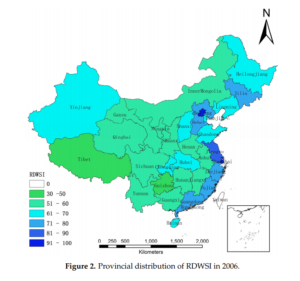The impacts of socioeconomic development on rural drinking water safety in China: A provincial-level comparative analysis
 Abstract/Summary:In China, achieving rural drinking water safety—meaning access to a safe, affordable, sufficient, and sustainable drinking water supply—remains a key challenge for government agencies and researchers. Using cross-sectional data at the provincial level, in this paper we examine the impacts of socioeconomic development on drinking water safety in rural China. Using a theoretical framework called Pressure-State-Response (PSR), existing data were organized into state and pressure indicators. Canonical Correlation Analysis was then used to analyze provincial-level relationships between the indicators. Significant drinking-water-safety-related differences were found across provinces. Our analyses suggest that, overall, China’s recent and rapid socioeconomic development yielded substantial benefits for China’s rural drinking water safety. However, this same development also negatively impacted rural drinking water safety via increased groundwater over-abstraction, reductions in water supply, and environmental contamination. The paper closes with a discussion of implications and options for improving drinking water policy, management, and regulation in rural China.
Abstract/Summary:In China, achieving rural drinking water safety—meaning access to a safe, affordable, sufficient, and sustainable drinking water supply—remains a key challenge for government agencies and researchers. Using cross-sectional data at the provincial level, in this paper we examine the impacts of socioeconomic development on drinking water safety in rural China. Using a theoretical framework called Pressure-State-Response (PSR), existing data were organized into state and pressure indicators. Canonical Correlation Analysis was then used to analyze provincial-level relationships between the indicators. Significant drinking-water-safety-related differences were found across provinces. Our analyses suggest that, overall, China’s recent and rapid socioeconomic development yielded substantial benefits for China’s rural drinking water safety. However, this same development also negatively impacted rural drinking water safety via increased groundwater over-abstraction, reductions in water supply, and environmental contamination. The paper closes with a discussion of implications and options for improving drinking water policy, management, and regulation in rural China.
The impacts of socioeconomic development on rural drinking water safety in China: A provincial-level comparative analysis
Authors: Li, H., Cohen, A., Li, Z., & Zhang, M.
Publication Year: 2019 | Journal / Publisher: Sustainability
 Abstract/Summary:In China, achieving rural drinking water safety—meaning access to a safe, affordable, sufficient, and sustainable drinking water supply—remains a key challenge for government agencies and researchers. Using cross-sectional data at the provincial level, in this paper we examine the impacts of socioeconomic development on drinking water safety in rural China. Using a theoretical framework called Pressure-State-Response (PSR), existing data were organized into state and pressure indicators. Canonical Correlation Analysis was then used to analyze provincial-level relationships between the indicators. Significant drinking-water-safety-related differences were found across provinces. Our analyses suggest that, overall, China’s recent and rapid socioeconomic development yielded substantial benefits for China’s rural drinking water safety. However, this same development also negatively impacted rural drinking water safety via increased groundwater over-abstraction, reductions in water supply, and environmental contamination. The paper closes with a discussion of implications and options for improving drinking water policy, management, and regulation in rural China.
Abstract/Summary:In China, achieving rural drinking water safety—meaning access to a safe, affordable, sufficient, and sustainable drinking water supply—remains a key challenge for government agencies and researchers. Using cross-sectional data at the provincial level, in this paper we examine the impacts of socioeconomic development on drinking water safety in rural China. Using a theoretical framework called Pressure-State-Response (PSR), existing data were organized into state and pressure indicators. Canonical Correlation Analysis was then used to analyze provincial-level relationships between the indicators. Significant drinking-water-safety-related differences were found across provinces. Our analyses suggest that, overall, China’s recent and rapid socioeconomic development yielded substantial benefits for China’s rural drinking water safety. However, this same development also negatively impacted rural drinking water safety via increased groundwater over-abstraction, reductions in water supply, and environmental contamination. The paper closes with a discussion of implications and options for improving drinking water policy, management, and regulation in rural China.
PDF on Publisher Website | PDF on OSF
